What is a Repeat Prescription?
Some medicines may be required to be taken on an ongoing basis to help manage your long-term condition. This is a repeat prescription.
How do I request a Repeat Prescription?
The quickest and easiest way to order your repeat prescription is through the NHS App or Patient Access. For information on how to register with these secure services, see our online services page. Remember to nominate your chosen pharmacy so that we can send your prescription electronically, use the NHS find a pharmacy site to search for one close to you. You will also have the option to include a message.
Patients who do not have internet access can request repeats by ticking their repeat slip to indicate the items needed and posting this in the box outside reception. Our reception team will also be happy to help at the desk. Alternatively, you can ask your community pharmacy to order your prescriptions for you – ask to sign up to their ‘repeat ordering scheme’.
*PLEASE NOTE THAT FOR SAFETY REASONS AND TO KEEP OUR PHONE LINES FREE, WE ARE UNABLE TO TAKE REPEAT PRESCRIPTION REQUESTS OVER THE PHONE.*
- We aim to review all prescription requests within 48 hours and either issue the prescription, or contact you to explain why your request cannot be issued. This is due to the large number of requests we receive daily, and because there are several steps involved in ensuring the prescription request is safe to be authorised. If your request is straightforward and you are not due a review, your prescription will often be issued more quickly than this. If we have a query about your request you may be contacted by text message or phone and asked to provide more information.
- There is the option to track your prescription request using the NHS app. Please be aware at particularly busy times of year, for example, around bank holidays, you will need to order earlier than usual to receive your prescription on time. There may be delays from time to time, but we always do our best to ensure you receive your medicines safely and on time.
- Prescriptions for regular medications will usually be for a duration of four or eight weeks at the discretion of your prescriber. In exceptional circumstances, for example travel, Oral Contraceptive Pills (OCP) and Hormone Replacement Therapy (HRT), NHS England allows us to issue a maximum of 12 weeks on one prescription. (For ‘controlled drugs’ which mostly includes strong painkillers, we are only able to issue a maximum of 30 days' supply). For anyone experiencing financial hardship and difficulty in paying for prescriptions please consider 'Prescription Prepayment Certificate' more info can be found at https://www.gov.uk/get-a-ppc.
- It is our standard practice to issue electronic repeat prescriptions which are sent straight to your nominated pharmacy. This means you don’t need to come to the practice to pick up your prescription. You can change your nominated pharmacy at any time by letting us know or updating your pharmacy on the NHS App, use the NHS find a pharmacy site to search for one close to you.
- Each time we issue your prescription, our prescribers will check if you are due for any monitoring or for a medication review. To ensure your safety, sometimes you will be asked to attend for a blood test, blood pressure check, or other monitoring so that we can make sure your medication is working for you and is not causing any side effects.
- Urgent requests - Please try not to run out of your medicines. When you are running low, e.g., have one to two weeks’ supply remaining, please request the next prescription.
If you accidentally run low or run out, we will try to process your request as quickly as possible, but please remember that the request process must be carried out thoroughly and safely and that GP practice teams are extremely busy. - Emergency supply requests for medicine can be requested from NHS 111 or 111 Online in an urgent situation. The pharmacy will check the GP record/National Care Record to ensure that they are not making duplicate supplies to ensure your safety and reduce waste.
- Medication reviews - A medication review is usually arranged annually for people taking multiple long term medications, sometimes more frequently, depending on the medication or condition being treated. A structured medication review is a more in-depth discussion between you and a GP or pharmacist. It is an opportunity to understand how you are managing with your medicines and for you to share any worries or concerns you may have.
- Please do not over order your medication. Once issued by your pharmacy, medication cannot be reused and will always be destroyed when returned to the pharmacy. If we notice you are ordering medicines too frequently, we may advise that you have a medication review and stop further prescriptions until we have spoken to you.
- All prescription-only medicines have been carefully assessed for their safety before they were licensed to be prescribed. Your prescriber and your pharmacy team will check if the medicines prescribed are safe for you. It is NOT safe to share your prescription-only medicines with friends, family members or colleagues.
- DO NOT SHARE your prescription medicine(s). According to the Medicines and Healthcare Products Regulation Authority, anyone who shares their prescription medicines, even with a family member, is breaking the law. The Medicines act specifies that prescription drugs should only be supplied to the individual for whom they were prescribed.
Since 2019 NHS England has asked GPs not to give prescriptions for medicines which are available over the counter. The NHS has spent hundreds of millions of pounds on prescriptions for items which are available over the counter, and by reducing the amount the NHS spends on over the counter medicines, it can give priority to treatments for people with more serious conditions, such as cancer, diabetes and mental health problems. You can find more information about the types of conditions that we have been told not to issue prescriptions for below.
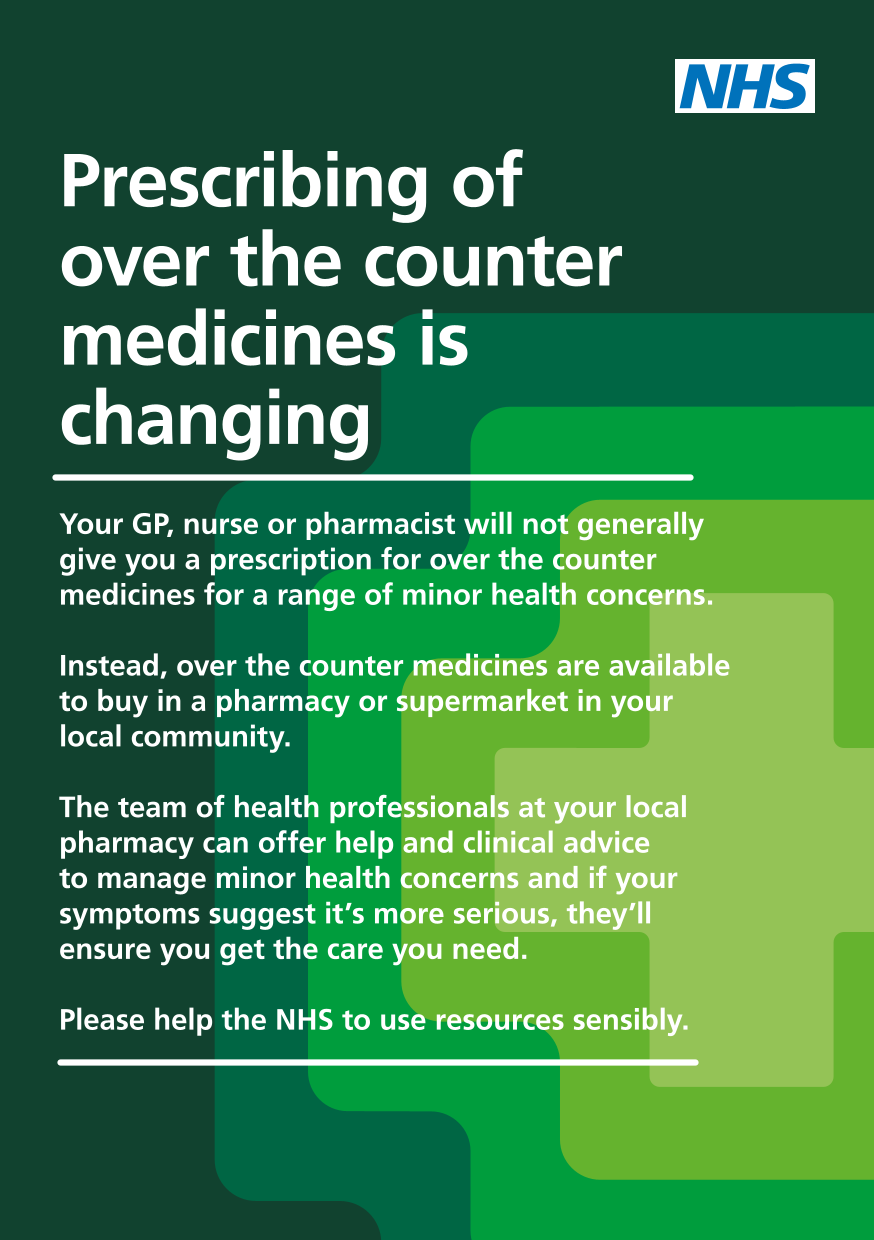
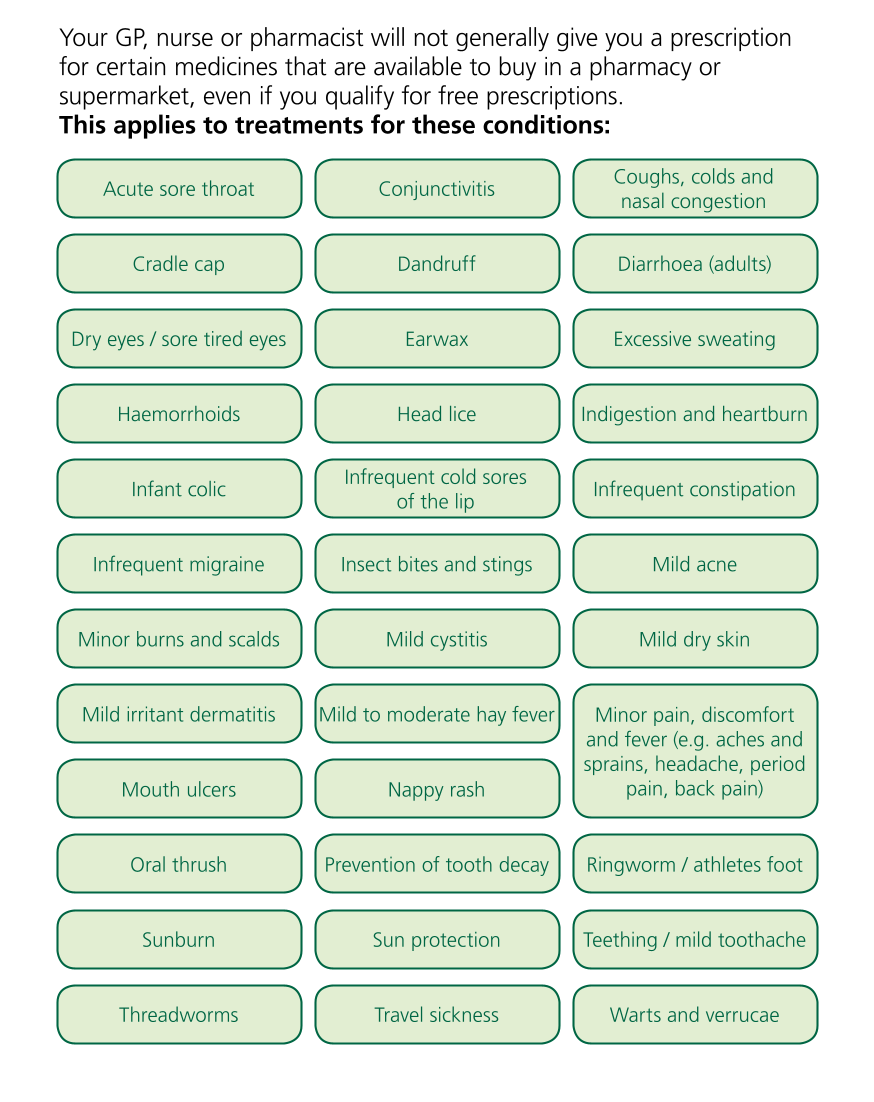

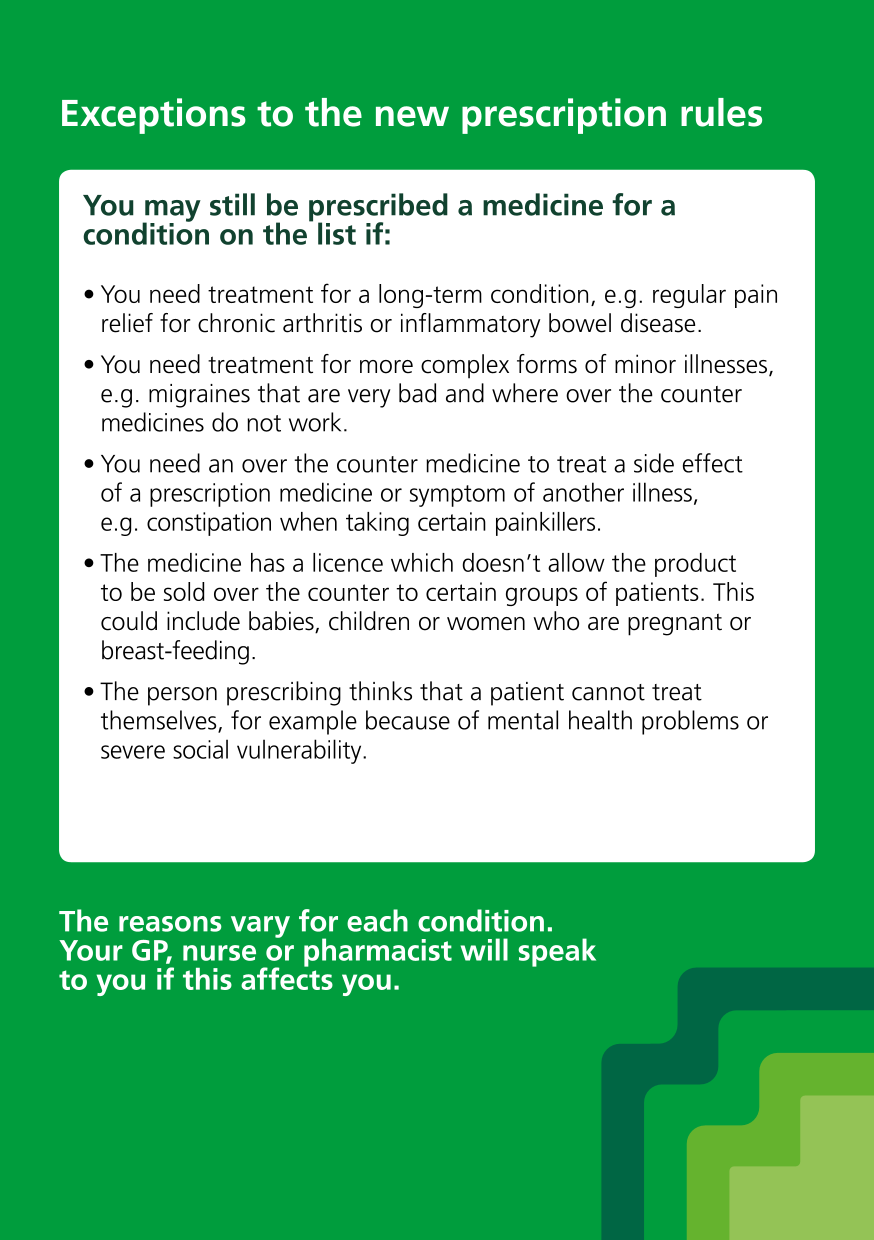
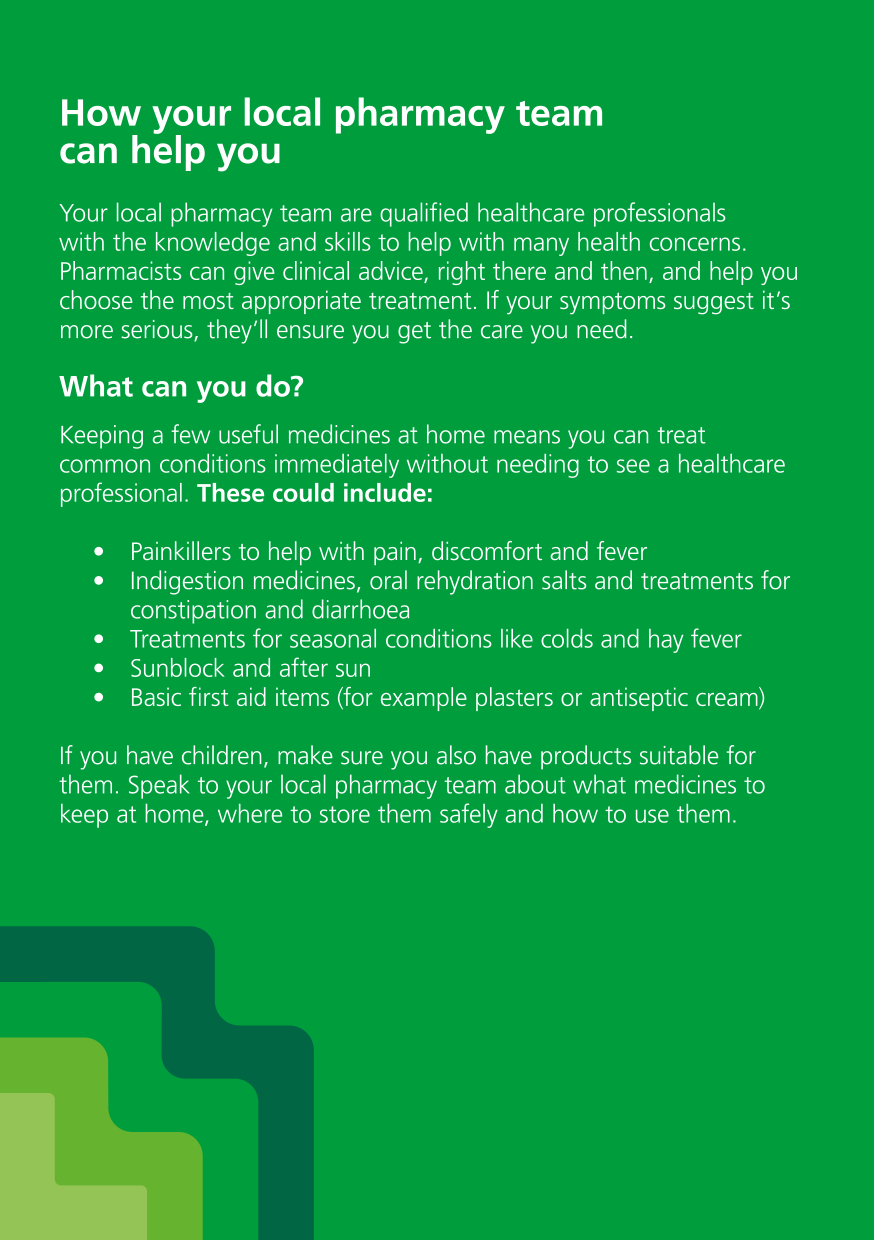
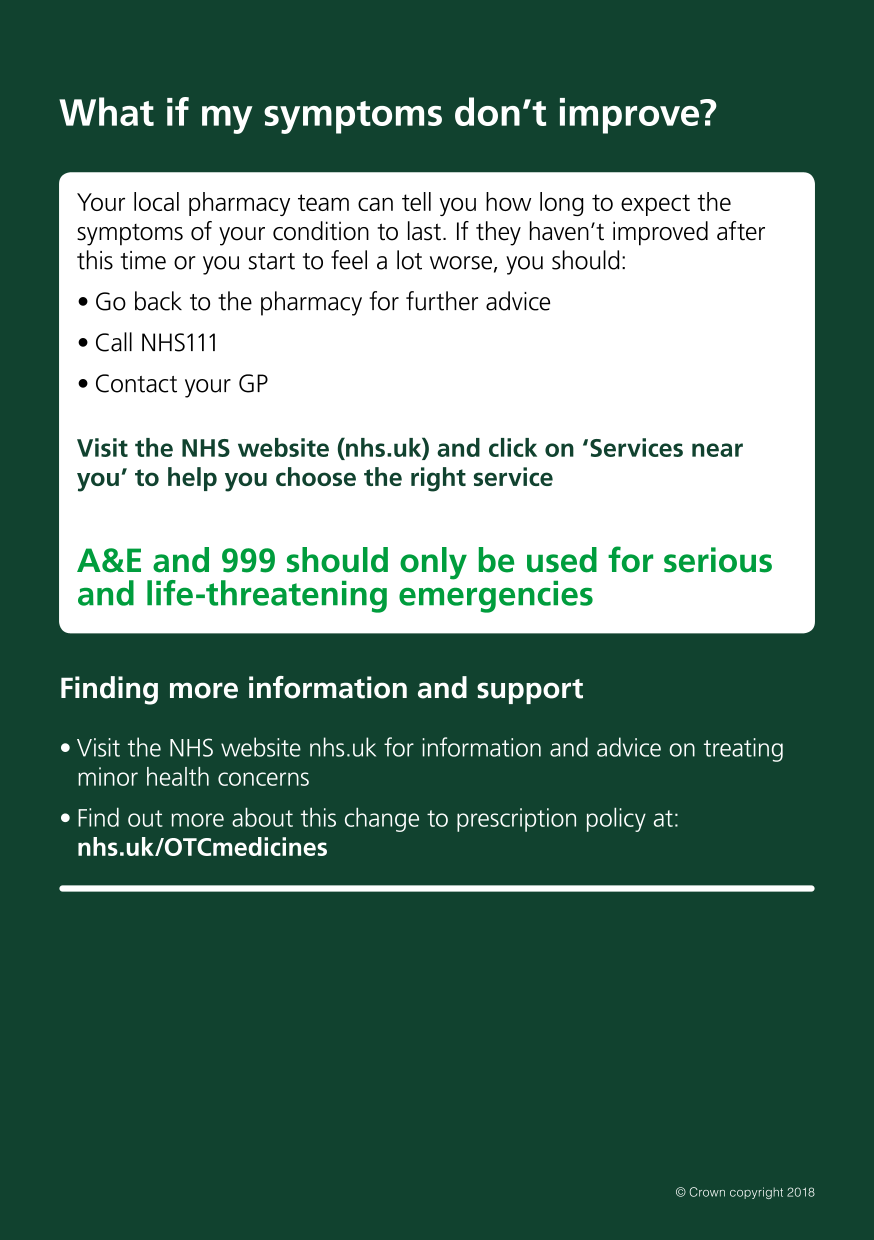
We are unable to prescribe sedatives, such as diazepam, for any procedure or scan. This includes MRI scans and dental procedures. If you feel you may need sedation, please speak to the team undertaking the procedure or scan, as they are responsible for providing this if needed.
GPs are not trained to provide the correct level of sedation for a procedure or scan. Providing too little sedation won’t help you, providing too much can make you too sleepy and can dangerously affect your breathing. After taking a sedative for a procedure or scan, you need to be closely monitored to ensure your safety.
Although diazepam makes most people sleepy, in some rare situations it can have an opposite effect and make people aggressive or agitated.
Scans and hospital procedures may often be delayed, meaning the team performing the procedure should provide the sedation, to ensure that you become sleepy and relaxed at the right time.
For more information about sedation see below:
https://rcoa.ac.uk/sites/default/files/documents/2022-06/12-SedationExp2021web.pdf
Why can I not see my medication on my repeat list?
There are a number of reasons why the medicine you are looking for may not be available for you to order online:
- If you were previously given a one-off prescription for a short-term problem, for example a course of antibiotics, you will need to contact us to be assessed again if you think the problem has come back. This is so that we can make sure that the same prescription is appropriate as you may need different treatment.
- If you have not ordered your medicine for a while, your medicine may have expired from your list. Please contact us to explain.
- If you only recently started this medication, or have changed dose, we may have asked you to contact us for a review before we issue more. This is so we can check the medicine is effective for you and that you have completed any necessary tests before we decide to prescribe it as a longer-term repeat.
- If you have recently been seen in a hospital clinic and they have made a non-urgent recommendation, it can take several weeks for us to receive your clinic letter and add any new items to your list. Please be patient if you can!
- If the medicine you require is not on your list, please contact us using e-consult.
Why am I being asked to Purchase Over-the-Counter Medicines?
Across the NHS, GP practice will not generally give prescriptions for over-the-counter medicines for minor conditions. Instead, we ask that you to buy these from your local pharmacy or supermarket. Community pharmacies can also help with advice on managing minor health conditions and use of medicines.
Example short term conditions that can be treated safely and effectively without a prescription:
- Colds and sore throats
- Heartburn and indigestion
- Constipation and diarrhoea
- Head lice
- Dry skin
- Dandruff
- Ringworm and athlete's foot
- Mild to moderate hay-fever and allergies
Exceptions are made on a case-by-case basis. For example, if you suffer with a long-term painful condition, it may be appropriate for us to prescribe paracetamol on prescription, but for short-term problems, most people will be asked to purchase this.
What is a Repeat Dispensing Prescription?
This system is sometimes used for stable repeat medications and allows your GP to send a series, or ‘batch’, of repeat prescriptions to your pharmacy in one go. This means there is no need for you to order them each time, you just need to ask your pharmacy to get your next repeat ready for you to collect, or for them to deliver to your home.
A repeat dispensing will usually be for one or two months at a time, repeated for up to a year. When the batch of prescriptions runs out, you will need to order a new prescription and may need to attend for monitoring or speak to your GP, nurse, or practice pharmacist for a review. Your pharmacy should tell you when you are on the last repeat and need to re-order.